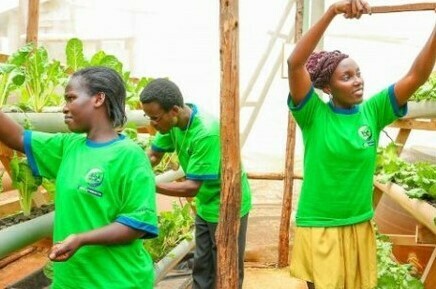Putting white-collar job ambitions on wait and returning to the farm might be the solution to the rising youth unemployment rate. Many jobless grads, however, would not pursue agriculture after failing to secure white-collar jobs.
Kiswahili Teacher Make a Killing in Chicken Business
Amagune earned his Bachelor of Education degree in Kiswahili and Religious Education three years ago.
His farming operation is the result of his 400-chicken business.
“I sell my broilers for KES 300 apiece to hotels in Kitengela, Isinya, and Kajiado.” He explained that the business is profitable since the chicks develop in five weeks.
According to him, there is an insatiable market for agricultural food in urban areas, and agriculture can’t go wrong as long as pests and illnesses are controlled.
“Traders come to my field for amaranth, cow peas, and jute mallow veggies. “The fruit is ready in the nearby towns,” he stated.
Inspiration to Others
Joash Kirui, a biological science graduate who produces mushrooms in Kiambu on the outskirts of Nairobi, stated, “I have motivated at least five of my colleagues who were jobless to get into agriculture when they witnessed me profiting from it.”
Kirui not only trains youngsters but also farmers who wish to expand their agricultural production and make more money.
“For a two-week training, I charge KES 10,000.” Mushrooms are what I will farm for the rest of my life since they are profitable. “I sell a punnet for KES 150 and harvest the crop three times,” he said, adding that he will continue to farm even if he has a formal job.
Stable Income
The political science graduate having failed to find a white-collar job, now isn’t complaining because his three-month-old crops provide a stable income.
“Even though I am looking for a job and expect to get one soon,” he stated, “I am comfortable financially.”
Musau charges shops Ksh 80 for a kilo of courgette and customers Ksh 10 apiece. “I got lucky and got market at a Westlands vegetable store.” He stated, “I supply them with 40 kilograms twice a week.”
Musau, like many other young people, stated he couldn’t wait for a job, despite his parents’ permission to utilize their land.
“On a rented half-acre in Korompoi, Kajiado County, I maintain broilers and produce traditional vegetables,” said Steve Amugune, 27.
As they enter the agriculture world, the youth are also producing jobs for others and serving as role models.
Amugune works with four people, Musau one and Kirui two, demonstrating how agriculture can be utilized not just to provide employment but also to foster entrepreneurship in East Africa.
University graduates have understood they are expected to be job creators, not job seekers, according to Ernest Manuyo, a business management expert in Nairobi.
Manuyo, on the other hand, believes that the government should assist the youth in encouraging agro-entrepreneurship.
Conclusion
Reports show that some youth enter farming after graduating from college, others do so after years of unemployment. A significant fraction, on the other hand, farms while still in school, allowing them to adjust comfortably after graduation.
Many people increasingly engage in side hustles to fulfil rising financial needs, such as farming, M-Pesa businesses, and selling apparel and footwear, among other things. The side hustles are managed remotely from their employers’ bustling workplaces, and often even directly in these offices.
Few would have predicted that office employees would one day turn their fancy automobiles into mobile grocery stands.’ Competing against those who many regards to be living on the edge. Agribusiness, on the other hand, is a highly profitable and high-potential investment.







